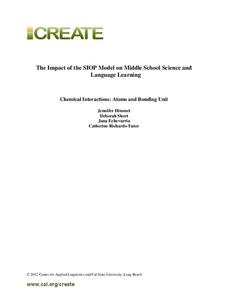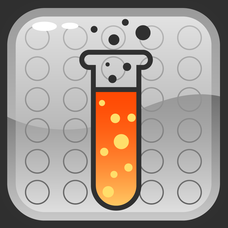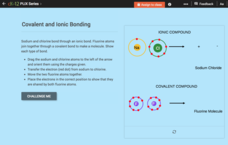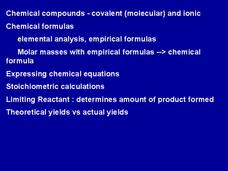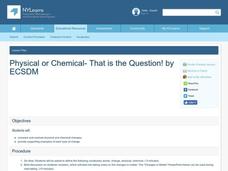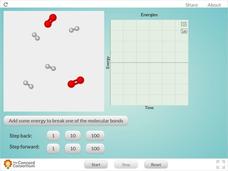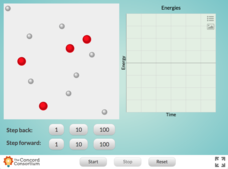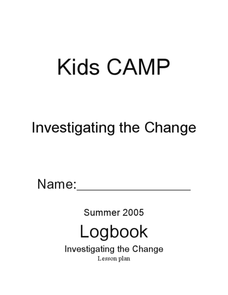Center for Applied Linguistics
Chemical Interactions: Atoms and Bonding
Watch budding chemists interact with the resource on chemical interactions. In the unit, six lessons provide an overview of basic chemistry, from understanding the development of atomic theory to distinguishing between ionic and covalent...
Scholastic
Study Jams! Physical & Chemical Changes of Matter
Poor Sam! His graham crackers have undergone a physical change, so he can't make his s'mores! Mia explains that their molecules haven't changed, therefore they are still graham crackers. The two teens then discuss clues that would...
Concord Consortium
What Is a Chemical Reaction?
Take your class inside a beaker for an up-close view of a chemical reaction! Junior chemists examine how chemical reactions occur using an interactive resource. The activity allows users to change the temperature and observe how it...
Carolina Biological Supply
Chemistry Formula Practice
Practice naming chemical compounds or stating the formula when given the name. Discover how well you have mastered these skills either by time or percentage correct.
PBS
Breaking it Down
After challenging themselves to correctly choose the form of erosion and length of time required for a given landform to develop, earth science class members model mechanical and chemical weathering with various lab demonstrations over...
CK-12 Foundation
Chemical Bonds: Covalent and Ionic Bonding
Get back to bonding basics. Science scholars get a chance to show what they know using a simple interactive. Pupils create models of covalent and ionic bonds before answering questions about each interaction. The resource includes a...
McGraw Hill
Stellar Spectroscopy Interactive
Stars seem to be a far away mystery... but it turns out we know much more about stars than one would think! An engaging lesson shows learners how to read a light spectrum to determine the temperature and chemical makeup of a star....
K20 LEARN
Rules Of The Mogwai: Lab Safety And Chemical Properties
When you don't follow the rules, bad things can happen! Kick off your next lab safety lesson using a resource from the K20 Center. Pupils partner up to decipher MSDS for common lab chemicals, brainstorm common safety rules and their...
Center for Learning in Action
Introducing Physical and Chemical Changes
Young scientists investigate chemical and physical changes to the states of matter—gas, liquid, and solid—as well as solutions and suspensions with a variety of demonstrations, grand conversation, and an interactive quiz to check for...
Curated OER
Chemical Compounds
Your young chemists will find these slides very informative. Groups and periods of the periodic table are labeled and described according to the charge. Comprehensive explanations of physical and chemical properties and how they relate...
Curated OER
Physical or Chemical- That is the Question!
Students observe the differences between physical and chemical changes in properties. Through the use of an interactive presentation, the students compare and contrast the changes and provide supporting examples of each type of change.
Concord Consortium
Reaction Between Hydrogen and Oxygen Molecules
When molecules of hydrogen and oxygen are combined, how does water form? Science scholars observe changes in kinetic and potential energy during a chemical reaction in an interactive. The resource features easy controls that allow users...
Concord Consortium
Temperature and Reaction Rate
Does increasing temperature increase the rate of a chemical reaction? Junior chemists examine the effects of temperature on reaction rate using an engaging interactive. Pupils select the temperature of the reaction vessel, then observe...
Concord Consortium
Chain Reaction Between Hydrogen and Oxygen
Looking for a simple way to teach conservation of energy in chemical reactions? Pupils can observe energy changes as water forms during a chain reaction between oxygen and hydrogen using an interactive. The resource instructs users to...
Concord Consortium
Reaction Between Hydrogen and Oxygen Atoms
Is this resource a great way for your class to observe bonding between oxygen and hydrogen? OH yeah! Scholars learn about the changes in kinetic and potential energy as molecules of oxygen and hydrogen interact. Kinetic, potential, and...
Concord Consortium
Stoichiometry and Balancing Equations
Is your stoichiometry lesson plan just not adding up? Incorporate an exciting interactive to balance things out! Chemistry scholars manipulate the number of molecules added to the reaction vessel, then observe as bonds form and break as...
American Chemical Society
What is a Chemical Reaction?
When a candle burns down, what happens to the mass that appears to be shrinking? Lesson begins with a demonstration of the chemical reaction of a candle burning. Then scholars use atom models to observe conservation of mass...
Concord Consortium
Making and Breaking Bonds: The Effect of Temperature
Time to turn the heat up on your next bonding lesson! Young chemists explore temperature, kinetic energy, and bonding through an interesting interactive. The controls allow individuals to vary the temperature, as well as pause progress...
Concord Consortium
Catalysis
Get ready to kick things up a notch! Young scientists explore the effects of catalysts using a fun interactive. Learners start the reaction without using a catalyst, then add one over time to examine its effects on reaction rate.
It's About Time
Chemical Names and Formulas
Abracadabra! Provide your class with the tools to perform a chemical "magic show" as they predict the charges of various ions, determine ionic compound formulas, and make observations to determine when a chemical reaction between...
Pearson
The Chemical Context of Life
An educational presentation includes atoms, molecules, the four major elements, as well as neutrons and protons. Additionally, slides focus on atomic number, mass number, atomic weight, polar and nonpolar covalent bonding, ionic...
Concord Consortium
Exploring Hydrophobic Core
How do the hydrophobic and hydrophilic regions of a protein affect its shape? Science scholars explore the molecular properties of protein molecules using a detailed interactive. The resource allows the user to rotate the protein, view...
Curated OER
Investigating the Change
Sugar crystal growth is observed as an example of physical change and cabbage juice pH indicator is used to demonstrate chemical change. The crystal growth is tracked over five days. The cabbage juice experiment is involved and can also...
Curated OER
Chemical Reactions
In this chemical reactions activity, students compare endothermic and exothermic reactions, closed and open systems, and reactants and products. Students review physical and chemical changes and how to balance equations. This activity...
